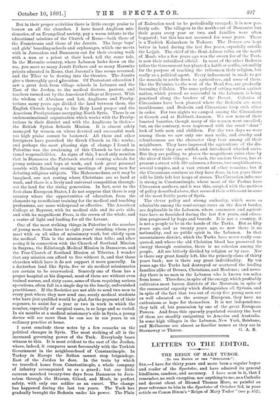LETTERS TO THE EDITOR.
THE REIGN OF MARY TUDOR.
LTO THY EDITOR 01 TRZ BracuToz.") have for thirty years and more been a regular buyer and reader of the Spectator, and have admired its general kindliness, candour, and accuracy. I have seen in it, that I remember, no such exception, nor anything to me, as a Catholic and devout client of Blessed Thomas More, so painful as your reference to him in the Spectator of October 3rd, in your article on Canon Dixon's "Reign of Mary Tudor "(see p.452).
After saying that Bonner had his prisoners (for heresy) flogged in his own garden at Fulham, you add, "therein, however, merely taking example from 'Blessed' Thomas More." This refers, I suppose, to Foxe's stories of Tewkesbury and Bain- ham being tied, one to Jean's Tree, and the other to the Tree of Truth, in Blessed Thomas More's garden. I refer you to the comment on and exposure of these stories, or mixed story, in the Rev. T. E. Bridgett's "Life and Writings of Sir Thomas More" (1891), p. 265-66; also to Blessed Thomas More's own solemn contradiction of them quoted at pp. 266-68 of that work ; also to Sir James Mackintosh's commentary on them, quoted p. 269, which he sums up thus :—" Foxe was the first who thirty years afterwards ventured to oppose it [Sir T. More's statement] in a vague statement which we know to be in some respects inaccurate, and on this slender authority alone has rested such an imputation on the veracity of the most sincere of men." I submit that on such a balance of authority—Foxe against More and Mackintosh—Foxe's stories ought at least not to be referred to as if they were of un- questioned veracity.
True, More mentions two, the only, cases of flogging inflicted by his orders, one of a child and servant—an inmate of his house—whom (he says) he caused to be stripped like a child by a servant for secretly teaching another child in the house his heresy against the Blessed Sacrament of the altar ; and the other, the whipping by constables at a tree in the street, of a man, late in Bedlam, who had disturbed public worship in churches and committed acts of great indecency. These cases, however, are distinct from those alleged by Foxe, and whether you approve them or not, obviously do not warrant your state- ment that the atrocious Bonner had been merely taking example from one of the noblest of Englishmen. I purposely pass by the wider question of Blessed Thomas More's par- ticipation in the then universal religious persecution, and limit myself to the passage quoted from your paper, and to the suggestion I venture to make that you should not allow it























































 Previous page
Previous page